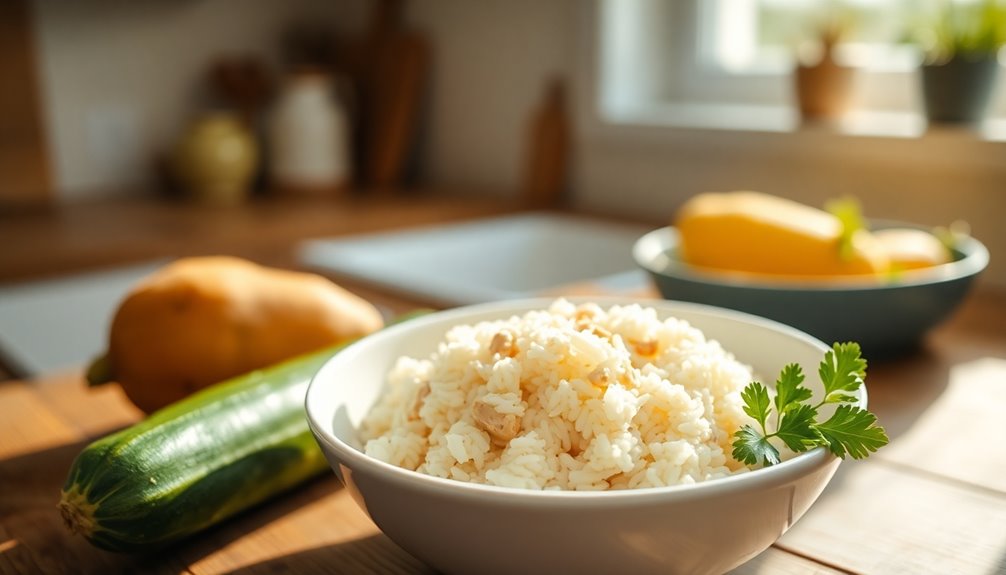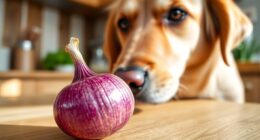When your dog has diarrhea, start with a short fasting period of 12-24 hours to reset their digestive system, ensuring fresh water is always available. Afterward, introduce a bland diet of boiled chicken and plain rice in equal parts. You can also include plain canned pumpkin or cooked porridge oats to help soothe their stomach. Gradually increase portion sizes as your dog improves, but avoid high-fat foods, dairy, and processed treats. Keep an eye on their stools and hydration levels, as this is vital for recovery. There's more helpful advice on managing your dog's digestive health ahead.
Key Takeaways
- Start with a 12-24 hour fast, ensuring fresh water is available to reset the digestive system.
- Gradually introduce a bland diet of boiled chicken and plain rice in equal parts.
- Incorporate plain canned pumpkin for its soluble fiber to help regulate stool consistency.
- Avoid high-fat, spicy, dairy, and processed foods to prevent further gastrointestinal upset.
- Monitor hydration and stool consistency, consulting a vet if diarrhea persists beyond 24 hours.
Understanding Diarrhea in Dogs
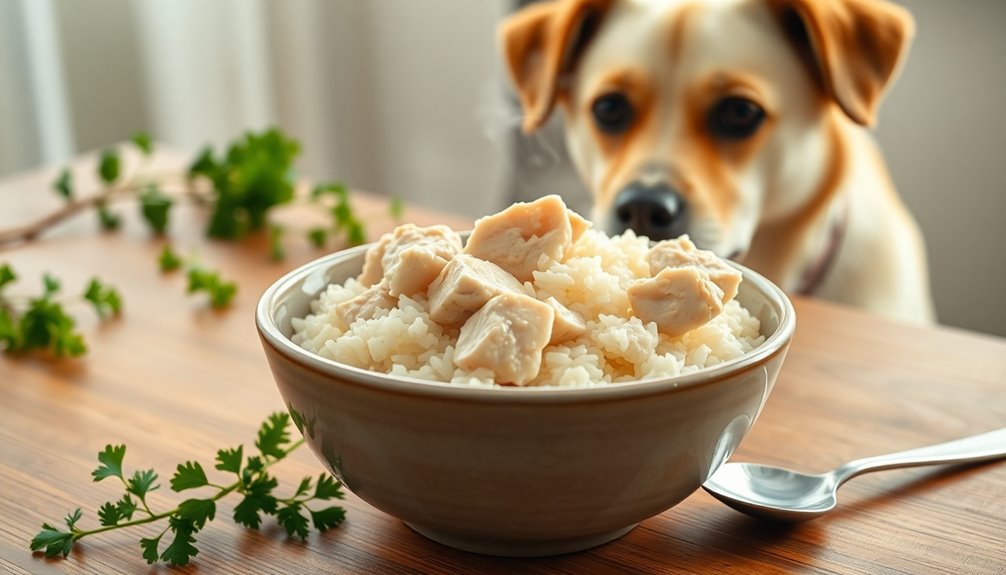
When your dog experiences diarrhea, it can be worrying, especially if it persists. Diarrhea in dogs can manifest as loose stools, which are shapeless, mushy, or watery feces.
Mild cases might resolve within three days, but if your dog shows symptoms like vomiting, lethargy, or blood in the stool, it's essential to seek veterinary attention.
Common causes include dietary indiscretion, infections, or stress, all of which can upset your dog's digestive system.
Early intervention is key; if loose stools continue after three days on a bland diet, don't hesitate to contact your vet for further evaluation.
Understanding these factors can help you manage your dog's diarrhea effectively and guarantee their health and comfort.
Fasting Guidelines for Dogs

When your dog has diarrhea, a short fasting period can help reset their digestive system.
It's essential to keep fresh water available during this time to maintain hydration.
Fasting Duration Recommendations
Fasting can be an effective way to help your dog recover from diarrhea. For healthy adult dogs, a fasting period of 12 to 24 hours allows the digestive system to rest and reset.
Here are some key points to take into account:
- Always provide fresh water for hydration during the fasting period.
- Young puppies, senior dogs, and those with pre-existing health conditions shouldn't be fasted without consulting a veterinarian.
- After the fasting period, if your dog shows no further symptoms of diarrhea, gradually introduce a bland diet to aid in recovery.
This process is similar to rebooting a computer, helping eliminate harmful substances.
Hydration Importance During Fasting
Ensuring your dog stays hydrated during a fasting period is essential for their recovery from diarrhea. Always provide fresh water to prevent dehydration, especially since fasting typically lasts 12 to 24 hours for healthy adult dogs.
This allows their digestive system to rest and reset, similar to rebooting a computer. Regular monitoring of your dog's hydration status is vital, as dehydration can lead to additional complications.
If you have a puppy, senior dog, or one with health issues, consult your veterinarian before starting a fasting regimen.
Implementing a Bland Diet

Implementing a bland diet can be a helpful way to soothe your dog's digestive upset. This diet typically consists of boiled chicken and plain rice in a 1:1 ratio. Start with small portions to monitor tolerance and feed every 2-3 hours.
- Use boiled chicken or hamburger mixed with rice.
- Gradually increase portion size as your dog improves.
- Watch for normal stools before returning to regular food.
If your dog experiences vomiting or ongoing diarrhea, seek veterinary advice immediately, as a bland diet isn't suitable for more severe conditions.
Always observe for any adverse reactions during this process and consult with a veterinarian if symptoms persist or worsen. Your dog's health is your priority!
Recommended Foods for Recovery
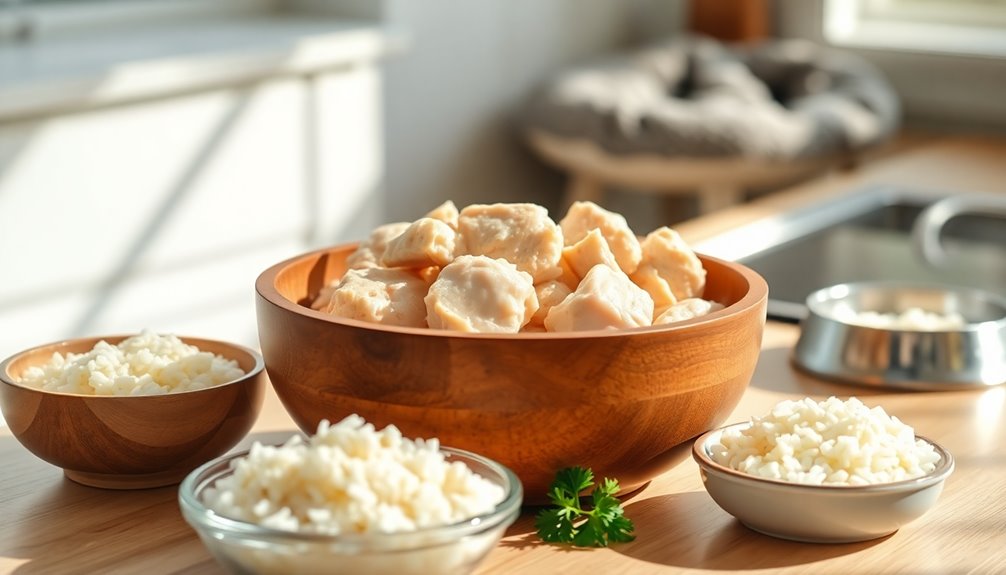
When your dog is recovering from diarrhea, choosing the right foods can make a significant difference in their recovery. A bland diet works wonders, typically consisting of a 1:1 ratio of boiled chicken and white rice. To enhance gut health, you can add plain canned pumpkin, which is high in soluble fiber to help regulate stool consistency. Cooked porridge oats also provide digestible starches and additional fiber. Here's a quick reference table:
| Food | Benefits |
|---|---|
| Boiled Chicken & Rice | Easily digestible nutrition |
| Plain Canned Pumpkin | Regulates stool consistency |
| Cooked Porridge Oats | Provides fiber and binding |
Introduce these foods gradually in small portions to monitor tolerance and adjust accordingly.
Foods to Avoid

To help your dog recover from diarrhea, it's important to avoid certain foods that can worsen their condition. Here are some key items to steer clear of:
- Fatty foods: These can irritate your dog's digestive system and exacerbate diarrhea.
- Dairy products: Many dogs are lactose intolerant, and dairy can lead to gastrointestinal upset.
- Spicy foods: Spices can further irritate the digestive tract, causing discomfort.
Additionally, avoid raw meats, as they may harbor harmful bacteria that could worsen diarrhea.
Also, don't give your dog human medications without veterinary guidance, as they can be harmful and disrupt their digestive system.
Keeping these foods out of your dog's diet will help promote a smoother recovery process.
Signs to Consult a Veterinarian
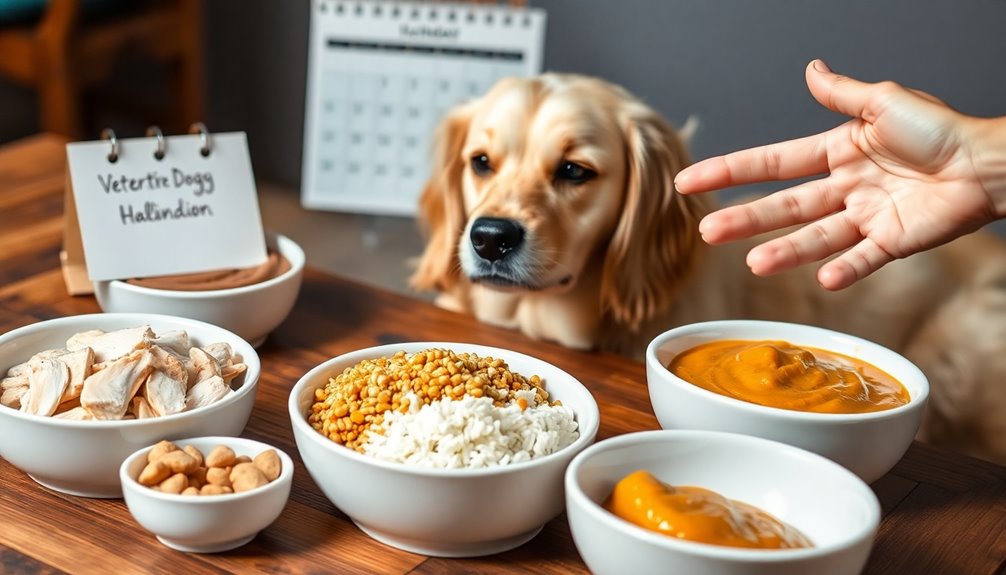
If your dog has diarrhea that lasts more than two days or shows signs like vomiting or lethargy, it's time to consult a veterinarian.
Keep an eye out for any symptoms of dehydration, as these can signal a more serious issue.
Monitoring your dog's recovery is essential—if things aren't improving, don't hesitate to seek professional help.
Persistent Symptoms Indicate Urgency
Because persistent symptoms can indicate serious health issues, it's important to consult a veterinarian if your dog's diarrhea lasts more than two days, even with dietary changes.
Watch for these urgent indicators that require immediate veterinary consultation:
- Signs of dehydration, like dry gums or lethargy
- Blood in the stool or vomiting
- Severe lethargy or sudden behavior changes
If your dog shows signs of pain, such as bloating or reluctance to be touched, don't delay seeking help.
Persistent diarrhea can point to underlying health issues that need proper diagnosis, including genetic mutations that may predispose dogs to certain conditions.
Accompanying Signs to Watch
Recognizing accompanying signs in your dog is essential for ensuring their health during bouts of diarrhea. If diarrhea persists for more than one day, especially with vomiting, it's time to consult your veterinarian.
Look out for signs of dehydration, like dry gums or wrinkled skin, which require immediate attention. Blood in the stool, whether bright red or resembling coffee grounds, is a serious concern that warrants a prompt vet visit.
Additionally, if your dog shows lethargy, refuses to eat or drink, or exhibits abdominal pain, these symptoms may indicate a more severe issue.
While monitoring your dog's recovery on a bland diet, any worsening symptoms or lack of improvement after 2-3 days also necessitates a vet consultation.
Monitoring Recovery Progress
Monitoring your dog's recovery progress is essential, especially when dealing with diarrhea. Keep an eye on these signs that indicate it's time to consult a veterinarian:
- Persistent diarrhea lasting more than two days
- Symptoms like vomiting, lethargy, or blood in the stool
- Signs of dehydration, such as dry gums and low energy levels
During the recovery, regularly check your dog's stool consistency and hydration.
A significant drop in energy or interest in food could signal a serious issue needing professional evaluation.
Remember, prompt action can prevent complications and guarantee your furry friend gets back to normal health quickly.
Always trust your instincts—if something seems off, don't hesitate to seek veterinary advice.
Nutritional Considerations

When your dog has diarrhea, choosing the right nutrition can make a significant difference in their recovery. Focus on high-quality, easily digestible foods that won't irritate their stomach. Incorporating lean protein like boiled chicken or turkey can provide essential nutrients without overwhelming their system. It's also crucial to monitor crude fat levels in their diet, as high-fat foods can lead to further gastrointestinal upset.
Here's a quick guide to help you:
| Nutritional Aspect | Recommendations |
|---|---|
| Fiber Levels | Add canned pumpkin for soluble fiber to regulate stool consistency. |
| Diet Type | Stick to a bland diet with soothing foods. |
| Protein Sources | Use lean protein for easy digestion. |
Additional Resources and Reading

To guarantee your dog recovers well from diarrhea, it's helpful to explore additional resources and reading materials that provide further insights into managing their diet and health.
Consider the following:
- Bland Diet Recommendations: Learn about the benefits of boiled chicken and plain white rice for easing gastrointestinal issues.
- Canned Pumpkin Benefits: Discover how canned pumpkin's soluble fiber can help regulate digestion and prevent dehydration.
- Monitoring and Veterinary Guidance: Understand the importance of monitoring your dog's condition and when to seek a veterinary consultation if diarrhea persists.
Avoid fatty foods and dairy, as these can irritate your dog's digestive system.
Returning back to a regular diet should be gradual, allowing your dog's system to adapt without further upset.
Frequently Asked Questions
What Is the Best Thing to Feed a Dog With Diarrhea?
When your dog has diarrhea, you want to choose foods that are easy on their stomach.
Boiled, skinless chicken or turkey mixed with plain white rice works well. You can also try adding canned pumpkin for extra fiber.
Cooked potatoes are good, too, but keep them plain. Start with small portions every few hours, and avoid fatty or spicy foods, as these can make their condition worse.
Keep an eye on their recovery!
How to Cure Diarrhea in Dogs Fast?
To cure your dog's diarrhea fast, you'll first want to give their tummy a break. Fasting for 12-24 hours lets their gastrointestinal tract rest.
Keep water available to prevent dehydration. After that, introduce a bland diet, like boiled chicken and rice, in small portions. This helps soothe their system.
If diarrhea lasts more than two days, or if you see vomiting or lethargy, don't hesitate to call your vet for advice.
What Food Will Firm up Dog Poop?
To firm up your dog's poop, consider incorporating soluble fiber-rich foods into their diet. Plain canned pumpkin is a great choice, as it helps regulate bowel movements.
Boiled white rice is another effective option, being easily digestible and absorbing excess water in the digestive tract. Lean proteins like boiled chicken or turkey provide nutrition without upsetting their stomach.
Avoid fatty foods and dairy, as these can worsen diarrhea and prevent firmness.
What Is the Brat Diet for Dogs?
When your dog's belly feels like a stormy sea, the BRAT diet can be a lighthouse guiding them to calmer waters.
This diet includes boiled rice, boiled chicken without skin, applesauce, and toast, all designed to soothe their upset stomach. It's easy to digest and helps firm up stools.
Just remember, it's a short-term solution; after 24-48 hours, reintroduce regular food gradually while keeping an eye on their tummy's response.
Conclusion
In the journey to soothe your furry friend's tummy troubles, remember that patience is key, much like Odysseus maneuvering through storms. By following the guidelines for fasting and introducing a bland diet, you can help restore balance to their digestive system. Keep an eye on their symptoms and make certain you're providing the right foods while avoiding those that could worsen the situation. With care and the right approach, your dog will soon be back to their playful self!

